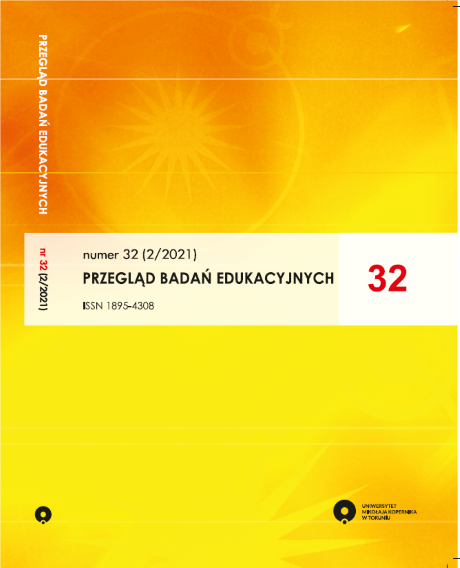Analysis of the State of Research on the Effectiveness of the Philosophical Inquiry Method
DOI:
https://doi.org/10.12775/PBE.2021.013Keywords
philosophy for children, philosophical inquiry, Matthew Lipman, educational researchAbstract
The aim of the article is to present and analyze the state of research on the effectiveness of the method of philosophical inquiry with children. The method was developed by the American philosopher Matthew Lipman (1923–2010) in the 1970s and, over the last few decades, has found many supporters and enthusiasts around the world. The dynamic development of the method was related to the implementation of numerous evaluation projects of the Philosophy for children (P4C) program, the aim of which was to examine the effectiveness of this method in the context of the development of cognitive and social competences of students. The article analyzes reports and reviews of the most important research projects related to the P4C method, selected on the basis of the adopted methodology, scope, and subject of the research. The conducted analysis leads to the conclusion that the researches on the effectiveness of P4C done so far, confirming that there exists a relationship between the participation of students in classes conducted with the method of philosophical inquiry and the improvement of educational achievements of these students in the area of cognitive and social competence.
As a result of the analysis, it was also found that the previous researches did not include the evaluation of the P4C method in the context of improving the competences of teachers working with this method. The potential positive importance of P4C for the development of teachers’ communication and teaching skills is signalled by many theorists and practitioners dealing with philosophizing with children.
References
Camhy, D., & Iberer, G. (1990). Nauczanie „Filozofii dla dzieci”. Badania nad umysłowym i osobowościowym rozwojem uczniów [Teaching ‘Philosophy for Children’. Research on the Mental and Personality Student’s Development]. Prakseologia, 1–2 (106–107), 183–212.
Cebas, E., & Garcia-Moriyón, F. (2015). What we Know About Research in Philosophy for Children? Retrieved 15 January 2019 from https://philoenfant.org/2015/10/30/resumede-103-recherches-en-philosophie-pour-les-enfants/.
Coleghhorn, P. (2002). Thinking Through Philosophy. Blackburn: Educational Printing Services. Colom, R., Garcia-Moriyón, F., Magro, C., & Morilla, E. (2014). The Long-Term Impact of Philosophy for Children: A Longitudinal Study (Preliminary Results). Analytic Teaching And Philosophical Praxis, 35, 1, 50–56.
García-Moriyón, F., Rebollo, I., & Colom, R. (2005). Evaluating Philosophy with Children: A Meta-Analysis. Thinking. The Journal of Philosophy for Children, 17(4), 14–22, doi: 10.5840/thinking20051743.
Gorard, S., Siddiqui, N., & Huat See, B. (2015). Philosophy for Children. Evaluation Report and Executive Summary. Durham: School of Education, Durham University. Retrieved 15 January 2019 =https://v1.educationendowmentfoundation.org.uk/uploads/pdf/Philosophy_for_Children.pdf.
Juuso, H. (2007). Child, Philosophy and Education. Discussing the Intellectual Sources of Philosophy for Children. Oulu: Oulun Yliopisto, Acta Universitatis Ouluensis E 91.
Lipman, M., & Bierman, J. (1980). Apendix B: Experimental Research in Philosophy for Children. In: M. Lipman, A.M. Sharp, & F. Oscanyon (Eds.), Philosophy in the Classroom (pp. 219–224). Philadelphia: Temple University Press.
Lipman, M., Sharp, A.M., & Oscanyon, F. (Eds.) (2008). Philosophy in the Classroom. Philadelphia: Temple University Press.
Łagodzka, A. (2014). Dyskusja dialogiczna: filozofia dzieciństwa i filozofia dorosłych [Dialogic Discussion: Philosophy of Childhood and Philosophy of Adult]. Analiza i Egzystencja, 25, 99–122.
Pobojewska, A. (2019). Edukacja do samodzielności. Warsztaty z dociekań filozoficznych. Teoria i metodyka [Education for Self-Reliance. Workshop on Philosophical Inquiries. Theory and Methodology]. Łódź: Wydawnictwo UŁ.
Siddiqui, N., Gorard, S., & Huat See, B. (2017). Non-Cognitrive Impacts of Philosophy for Children. Project Report. Durham: School of Education, Durham University. Retrieved 15 January 2019 from http://dro.dur.ac.uk/20880/1/20880.pdf?DDD34+DDD29+czwc58+d700tmt.
Slade, Ch. (1992). Creative and Critical Thinking. An Evaluation of Philosophy for Children. Analytic Teaching, 13(1), 25–36.
Topping, K.J., & Trickey, S. (2007a). Collaborative Philosophical Enquiry for Schoolchildren: Cognitive Gains at 2-Year Follow-Up. British Journal of Educational Psychology, 77, 787–796, doi: 10.1348/000709907X193032.
Topping, K.J., & Trickey, S. (2007b). Impact of Philosophical Enquiry on School Students’ Interactive Behavior. Thinking Skills and Creativity, 2, 73–84, doi: DOI:10.1016/J.TSC.2007.03.001.
Trickey, S., & Topping, K.J. (2006). Collaborative Philosophical Enquiry for School Children. Socio-Emotional Effects at Eleven to Twelve Years. School Psychology International, 27, 1–16; doi: 10.1177/0143034306073417.
Trickey, S., & Topping, K. J. (2004). “Philosophy for Children”: A Systematic Review. Research Papers in Education, 75(3), 365–380, doi: 10.1080/0267152042000248016.
Trickey, S. (2005). Promoting Social and Cognitive Development Through Collaborative Enquiry: An Evaluation of the “Thinking Through Philosophy” Programme. Retrieved 15 January 2019 from http://www.clacksweb.org.uk/document/228.pdf.
Downloads
Published
How to Cite
Issue
Section
Stats
Number of views and downloads: 418
Number of citations: 0



